2023 IG Wealth Management Walk for Alzheimer’s
A Message From Our New CEO
Happy Pride Month!
Celebrating Father’s Day
Annual General Meeting & Volunteer Recognition
Sharing and Connecting: How Support Groups Can Help
2SLGBTQ+ Safe & Inclusive Healthcare Guide
Taking Care of Your Senses
Become a Dementia-Friendly Community Partner
Care4U Family Conference 2023 – Save the Date
Join Us for the New Season of Dementia Care
Our 2023 Spring Education Calendar
Donate Your Games to Minds in Motion!
Upcoming Support Groups
Vaccination Decision-Making in Long-Term Care
What Should Canadians Know About Donanemab’s Latest Drug Trial Results?
Follow Us On Social Media
Donate Today to Help Our Work Continue
Another Successful IG Wealth Management Walk for Alzheimer’s!

The atmosphere buzzed with excitement as more than 1,000 Walkers flooded into Assiniboine Park on Saturday, May 27 for the 2023 IG Wealth Management Walk for Alzheimer’s. It was incredible to see so many people and teams come together to support and fundraise for people impacted by dementia. And of course, there was a lot of music, cheering and laughter filling the Park throughout the day.
Our Walk website remains open until June 30 and if you hadn’t had the chance, you can still donate to help support people living with dementia across Manitoba. Visit alzheimer.mb.ca/wfa2023 and donate today!
A big thank you to all Walk participants, donors and volunteers for helping to make the 2023 IG Wealth Management Walk for Alzheimer’s a huge success in support of people living with dementia.
A Message From Our New CEO
 Thank you to everyone for the warm and supportive welcome as I step into the role of CEO at the Alzheimer Society. I feel fortunate to lead this organization alongside our incredible team of volunteers and staff. People living with dementia and their care partners, including friends and family, count on the Alzheimer Society to be a strong voice for them – an ally in their corner and a champion for their needs.
Thank you to everyone for the warm and supportive welcome as I step into the role of CEO at the Alzheimer Society. I feel fortunate to lead this organization alongside our incredible team of volunteers and staff. People living with dementia and their care partners, including friends and family, count on the Alzheimer Society to be a strong voice for them – an ally in their corner and a champion for their needs.
With that in mind, we turn our thoughts to the provincial election taking place on October 3.
While each person’s experience with dementia is unique, there are common challenges that many people talk to us about and these have become our priority issues for the fall election:
- Improved housing options for seniors, including those living with dementia
- Additional financial supports for care partners
- Improved home care supports
- Strategies for building more dementia-friendly communities
- Improved supports to navigate the healthcare system
Sixty-two percent of Manitobans have or have had, a close friend or family member with dementia. Together we can help candidates feel that impact. We will ask each party about their plans on these issues and encourage you to do the same.
As candidates begin reaching out for your support, let them know that you have been impacted by dementia. Let them know you want to see improvements in dementia care and ask them if it is a priority for them. There is strength in numbers and in our passion and commitment to supporting those on a dementia journey.
Visit our elections webpage for more details on these important topics and ways you can help advocate for improved support for families impacted by dementia over the coming months.
We’re in this together – the Alzheimer Society is here as a champion, an ally, and a source of knowledge, community and support. I look forward to working with all of you as we work to support Manitobans on a dementia journey; today and into the future.
Happy Pride Month!

June is Pride Month – a time to celebrate and show support for the 2SLGBTQ+ community!
We recognize that 2SLGBTQ+ individuals may face unique challenges when it comes to dementia care and support, which you can read about in our 2SLGBTQ+ Safe & Inclusive Healthcare Guide article below.
As an organization dedicated to supporting people living with dementia and their families, we are committed to creating a safe and inclusive space for everyone in all our programming.
Let’s continue working to build a society that celebrates diversity and the 2SLGBTQ+ community all year long. Happy Pride Month from the Alzheimer Society!
Celebrating Father’s Day

With Father’s Day just around the corner on Sunday, June 18, we want to recognize those who are fathers and father figures, those who have lost their father, fathers who are grieving a loss, fathers who are giving it their all as care partners and fathers living with the challenges and changes that accompany dementia.
For anyone celebrating, struggling or grieving this Father’s Day, our Client Support staff are here to listen and help if you need support navigating this time of year.
For ongoing support, we have a Men’s Coffee Talk group that offers support to male-identifying care partners, giving them the opportunity to meet and share information about their experiences caring for someone living with dementia.
Annual General Meeting & Volunteer Recognition
Please join us as we celebrate a year of accomplishments and recognize our dedicated volunteers at our Annual General Meeting.
Wednesday, June 21
Alzheimer Society – Provincial Office
10-120 Donald Street, Winnipeg, MB (Mezzanine Level)
5:30 pm
RSVP to Bonny Neal by Friday, June 16 at [email protected] or 204-943-6622.
Sharing & Connecting: How Support Groups Can Help
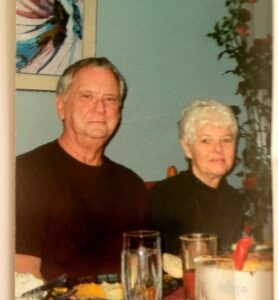
Dave and his wife in 2014
Dave Curti is a true believer that talking with others in a support group environment helps care partners navigate the challenges of dementia by offering support, encouragement and comfort from others experiencing similar situations.
“It’s nice to meet with others who understand what it’s like to care for someone living with dementia. We help each other by sharing advice and talking about what we’re going through,” says Dave.
Dave reached out to the Alzheimer Society for information and support at the beginning of 2021, when his wife’s Alzheimer’s symptoms were progressing. He signed up for the monthly newsletter, where he learned about the Society’s support group offerings and decided to join the Care Partner Support Group in Transcona. Soon after, he also began attending the Men’s Coffee Talk Group and the Support Group for Spouses of Persons with Dementia Living in Long-term Care.
Dave says the group for spouses of persons living with dementia in long-term care has helped him a lot since his wife moved into a personal care home. “Moving my wife into personal care was a difficult and emotional time. It was a big change to suddenly cope with. But listening to the other group members – I realized this is something we’re all struggling with, that I’m not alone.”
Caring for a spouse who moves into long-term care brings unique challenges and it can be difficult to adjust. Support groups like the one Dave attends create space for conversations around complicated issues care partners may be struggling with, like self-identity, the loneliness that comes from living separately from your spouse and feelings of guilt.
“It’s hard because, unlike caring for a parent, you’ve lived with your spouse for a long time. And then one day, you just don’t anymore,” Dave says.
Dave encourages others to try out a support group if they’re caring for someone living with dementia. He says these groups are a great way for care partners to take the time to care for themselves. Talking with others who understand what you’re going through can really make a difference.
If you’re interested in finding a support group that’s right for you, you can learn more about our offerings on our Support Group page. With a range of topics, our support groups aim to meet the different challenges care partners may face.
Dave would like to give special thanks to his support group leaders for all the work they do. He is grateful for having a space where he and other care partners can comfortably talk and share their experiences.
All of our support groups are inclusive environments for people of different ethnicities, cultures or persons who identify as part of the 2SLGBTQ+ community.
2SLGBTQ+ Safe & Inclusive Healthcare Guide

June is Pride Month, and we want to offer some tools that might help members of the LGBTQ+ community as they navigate a dementia journey.
Seeking a diagnosis and accessing services can be confusing and overwhelming for anyone. People who identify as 2SLGBTQ+ face the risk of receiving inappropriate care based on misconnections or misinformation about their gender or sexual identity.
Having conversations about your preferences related to healthcare is an important step when accessing care from professionals or talking to your family about future plans. Canadian Virtual Hospice has a tool to help those who identify as 2SLGBTQ+ voice their care concerns and preferences so they can receive inclusive, respectful care.
My Choices for Safe and Inclusive Healthcare is a guide to help people who identify as 2SLGBTQ+ have conversations with healthcare providers, plan for their future care, and identify key information to share with others. This document is a place to record information related to your health care needs to help you have easier conversations in the future. It’s a good idea to have this document with you in the following circumstances:
- At doctor appointments
- When calling 911
- At the emergency department
- With home care workers
- When accessing any other healthcare services
This guide is part of a series of resources called Proud, Prepared, and Protected which support 2SLGBTQ+ inclusive care, including palliative care. The resources were developed by people who identify as 2SLGBTQ+ and the Canadian Virtual Hospice.
At the Society, we uphold the principle that our organization is an inclusive and safe space for people of different abilities, religions and the 2SLGBTQ+ community. If you need help or have questions about navigating healthcare systems, our First Link Client Support staff is here to listen and help. Connect with us today by visiting our We Can Help page.
Taking Care of Your Senses
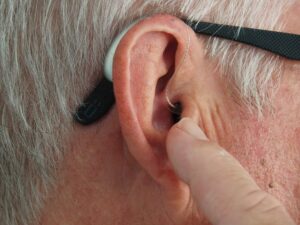 Our eyes, ears and nose help us process so much of life. Scientists are currently studying whether the risk of cognitive problems can be reduced when these conditions are treated — with glasses, eye surgery, hearing aids, or other health care approaches.
Our eyes, ears and nose help us process so much of life. Scientists are currently studying whether the risk of cognitive problems can be reduced when these conditions are treated — with glasses, eye surgery, hearing aids, or other health care approaches.
Last month, the National Institute on Aging (NIA) published an article called: “Take care of your senses: The science behind sensory loss and dementia risk.” This article reviews current research and evidence that shows a connection between sensory decline and dementia.
Vision
Untreated vision loss can reduce social interaction, emotional well-being and physical activity – all risk factors in cognitive decline.
Using data from the Health and Retirement Study, NIA-funded scientists recently made the case for including vision impairment as a risk factor for dementia, estimating that nearly 100,000 dementia cases in the U.S. could possibly have been prevented with existing vision treatments.
Hearing
Untreated hearing loss forces the brain to work harder, which ultimately overwhelms the brain’s networks that are normally used for memory and thinking. Hearing impairment can also lead to social isolation. Older adults may avoid social interactions if they struggle to hear or have difficulty understanding conversation. This results in less sensory stimulation, which can increase your risk of dementia.
Experiencing some vision and hearing impairment are common as we age, but studies show that those with dual sensory decline are at a higher risk for developing dementia. However, both vision and hearing decline are very treatable. It’s always important to talk to your doctor about any sensory changes you are noticing, so you can stay on top of your brain health.
Smell
The NIA article also suggests that because our sense of smell is closely linked with memory, possibly more so than any of our other senses, declining smell sensitivity can foreshadow dementia.
Researchers encourage older adults who are experiencing declines in their sense of smell to see their doctors to rule out other causes. Although not all smell loss may predict cognitive decline, it can be linked to a few different neurodegenerative diseases.
Sensory problems are common signs of aging and don’t always affect cognitive health, but they can have a significant effect on the quality of life. It’s also important to remember that risk factors may increase the likelihood of dementia developing, but it’s not a certainty.
All in all, getting your vision, hearing and sense of smell checked by a doctor is one step you can take to help maintain overall brain health.
To learn more about the risk factors of dementia, visit our Brain Health page.
Become a Dementia-Friendly Community Partner
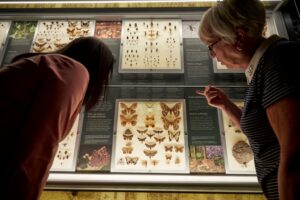 We are looking for new organizations to partner with and join our Community Programs initiative!
We are looking for new organizations to partner with and join our Community Programs initiative!
Discover. Explore. Get Involved. aims to partner with community organizations to give people living with mild to moderate signs of dementia opportunities to get out and participate in engaging activities with their family members and friends.
Through training and one-on-one support from our Dementia-Friendly Community Program Manager, you will learn how to make simple but mighty changes to create a dementia-friendly space where individuals and care partners can participate in recreational programming.
Let’s work together to provide accessible and supportive environments, where people living with dementia and their care partners are included and respected. You can view a list of our current community partners here: Discover. Explore. Get Involved.
If you’re interested in becoming our community partner, contact the Dementia-Friendly Community Program Manager, Nicole McDonald at [email protected]
Care4U Family Conference 2023 – Save the Date
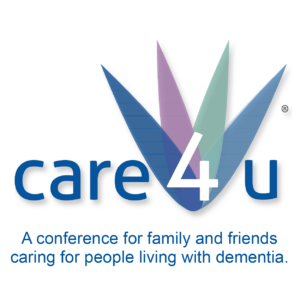 The Alzheimer Society invites you to join us this October for our Care4u Family Conference 2023. We’ll be back in person this year for a day of learning strategies and resources to help you find and strengthen your courage as a care partner for someone living with dementia.
The Alzheimer Society invites you to join us this October for our Care4u Family Conference 2023. We’ll be back in person this year for a day of learning strategies and resources to help you find and strengthen your courage as a care partner for someone living with dementia.
When: Saturday, October 28 | 9:00 am – 3:30 pm
Where: Canad Inns Destination Centre Polo Park, 1405 St. Matthew’s Ave., Winnipeg
Registration Opens August 2023
This event is sponsored by:
Dementia Care Professional Development Series
The Complex World of Dementia Care
Sponsored by All Seniors Care
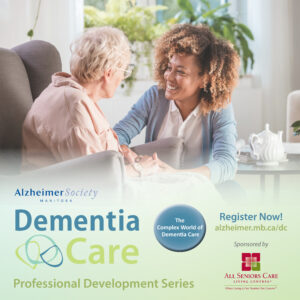
Join us for our Dementia Care 2023-2024 Professional Development Series! Sessions are geared towards healthcare staff and community service providers and take place online monthly (plus three in-person) until March 2024.
Unpack the unique challenges and intricacies involved in caring for people with dementia while exploring practical approaches relevant in day-to-day situations. With topics ranging from cultural sensitivities to the importance of inclusiveness, these sessions will empower healthcare professionals to offer respect, compassion and empathy to those living with dementia.
For only $30, you get access to all virtual sessions PLUS the option to register for in-person workshops! (Additional charge for in-person sessions.)
Our next session titled, A New Way of Looking at Responsive Behaviours, takes place on Thursday, June 15, from 2 – 3 pm. Come learn about possible reasons why people living with dementia might appear to walk continuously, eat compulsively, hide or collect items or seem restless towards the end of the day and learn about communication and de-escalation strategies when behaviours and strong emotions arise.
We encourage anyone working with people with dementia whether in the community, in hospitals or in personal care homes to register. These sessions add up to 30 completed hours of education that may be used towards professional development or continuing education hours.
Visit the dementia care website to learn more about all the sessions, speakers and to register now!
Check Out Our 2023 Spring Education Calendar!

Join us for our last few spring education sessions! These sessions are offered both in-person and via Zoom and cover a variety of topics to help you on your dementia journey. The sessions we’re offering this spring are:
Living With Dementia: First Steps –
Part Three: Saturday, June 10, 10 – 11:45 am
Click here to register for this Living With Dementia session.
*Please note that you don’t need to attend/watch the Living with Dementia sessions in order.*
Family Education: Next Steps –
Moving From Strain to Strength – Addressing Challenging Family Dynamics
Wednesday, June 14, 2023, 2 – 3 pm
Location: Virtual or Lindenwood Manor, Winnipeg
Speaker: Lois Litz, Retired Spiritual Director,
Lindenwood Manor
Click here to register for this Family Education session.
How better design can help people living with dementia
Join the Alzheimer Society of Canada on June 13 at 12 pm Eastern Time for a free conversation about how different kinds of design — and designers — can improve the lives of people with dementia.
Click here to register.
Q&A with the Alzheimer Society’s Client Support Team
July 12 from 2 – 3 pm
Online via Zoom
Do you have questions about dementia? Caregiving strategies? Communication tips? Join Sarah Dueck, Client Support Coordinator and Support Group Lead, who will provide a short presentation on some of the common questions received by the Client Support team about navigating the dementia journey. Sarah will also leave time for attendees to ask other questions during an extended Q & A period.
Presented by: Sarah Dueck – Client Support Coordinator and Group Lead with the Alzheimer Society of Manitoba.
Click here to register for this Q&A with the Society’s Client Support Team.
Visit the links below for more details on these upcoming sessions!
Family Education Spring 2023 Calendar
Family Education – Alzheimer Society of Manitoba
Donate Your Games to Minds in Motion!
Do you have any new or gently used board games, card games or activity games? Minds in Motion is currently accepting donations! We are looking for specific games for our Minds in Motion program. Here are a few examples of things we could use:
- I Spy or Where’s Waldo books
- Connect Four
- Mad Gab
- Telestrations
- Card or counting games
- Outdoor activities & equipment (bocce ball, golf clubs, hockey sticks)
If you have something you would like to donate, please contact our Dementia-Friendly Community Program Manager, Nicole McDonald at [email protected].
Vaccination Decision-Making in Long-Term Care – Interview Opportunity

The University of Manitoba Centre on Aging is conducting a study on the vaccination decision-making process in personal care homes in Manitoba and is looking for participants for the second stage of their study. The goal of this study is to learn about the experiences of people who work or volunteer in PCH, as well as family and friends of residents, with the COVID-19 vaccination process. To be eligible to participate, you must be 18 years old or older and either:
- work or volunteer at a PCH during the pandemic or;
- a family member or friend of a PCH resident during the pandemic who was not able to provide their own consent to be vaccinated against COVID-19.
Participants will be asked to take part in a structured interview to share their experience with the COVID-19 vaccination decision-making process. The interview will last for around 1 hour and include questions regarding the decision-making process for the COVID-19 vaccine for residents.
If you would like more information about the study, would like to participate or if you have any questions, please send us an email at [email protected] or call us at 204-474-6583.
Upcoming Support Groups

Support groups provide participants with an opportunity to learn more about dementia and its progression, share feelings and common experiences, exchange practical coping strategies and mutual support, as well as participate in meaningful discussions.
We welcome everyone to this inclusive environment for people of different ethnicities, cultures or persons who identify as part of the 2SLGBTQ+ community.
Upcoming Care Partner Support Groups:
- River Ridge II
2701 Scotia St
Fourth Tuesday of the month, from 7 to 8:30 pm
[email protected]
*Note: Per internal restrictions at River Ridge II, all participants are encouraged to wear a face mask at all times while in the building.
- The United Church in Meadowood
1111 Dakota St
Second Monday of the month, from 2 to 3:30 pm
[email protected]
- Men’s Coffee Talk Support Group
Alzheimer Society of Manitoba – 10-120 Donald St
Fourth Thursday of the month from 10 – 11:30 am
[email protected]
Additional Information and Registration
For more information about current and upcoming support group opportunities, or to register for a support group, please contact the First Link Client Support team at (204) 943-6622 or email us at [email protected]. You can also view our full list of support groups on our Support Groups page.
If connecting via email, please include your first/last name and the name of the support group you are interested in.
Our new support groups were made possible by a multi-year commitment for our First Link program from the Jessiman Foundation. A heartfelt thanks to the Jessiman family for this leadership gift that has allowed us to expand our programs in such a significant way.
Your Questions, Answered: What Should Canadians Know About Donanemab’s Latest Drug Trial Results?

American drug company Eli Lilly and Company released some results from a trial of donanemab, a drug that aims to target Alzheimer’s disease. Here’s what people in Canada might want to know about it.
Click here to learn more on the Alzheimer Society of Canada website.
Follow Us On Social Media
Join us on Facebook, Instagram, Twitter and LinkedIn for the most current news, information and resources. If you’re already following us on social media, invite your friends to do the same!
We Rely on Your Donations to Continue Our Work

Your gifts are put to immediate use through our helpline, support groups and education programs.
Remember. You Are Not Alone.
We are here to help you and your family no matter where you are in your dementia journey. You can reach a comforting ear by phone or get a quick response by email. Call us at 204-943-6622 (Wpg), 1-800-378-6699 (MB) or email [email protected]

